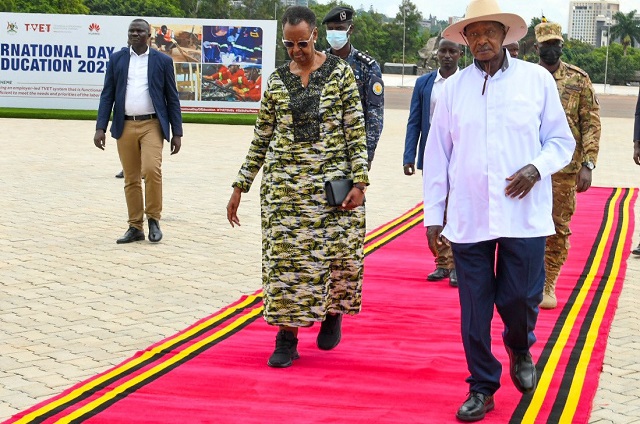
KAMPALA, UGANDA | THE INDEPENDENT | President Yoweri Kaguta Museveni has tipped Ugandans to embrace Artificial Intelligence (AI) as an enabler of national transformation, warning that Africa risks being left behind in the ongoing global technological revolution.
Speaking as Chief Guest during Uganda’s belated International Day of Education celebrations at Kololo Independence Grounds on Tuesday, President Museveni urged the public and education stakeholders to prioritise science and innovation to avoid the historic pitfalls that once left Africa vulnerable to colonisation.
Museveni blamed colonialism on Africa’s historical lack of access to education and technology, asserting that the continent’s underdevelopment can only be reversed through deliberate investments in science, technology, and free universal education.
He reiterated that Uganda’s development strides have long been hindered by low literacy levels and emphasised that Universal Primary and Secondary Education remain the ultimate solutions to illiteracy and underdevelopment.
President Museveni challenged public school administrators to implement the no-fees policy without compromise, condemning those who continue to charge fees as saboteurs of the nation’s future. The president accused greedy school heads of derailing poor children’s dreams by imposing financial barriers that force many to drop out.
He said this was one of the driving factors behind the government’s creation of free Zonal Industrial Skilling Hubs, which he credited for reviving hope among idle and unemployed youth. “The skilling hubs should be the benchmark for free vocational education in Uganda,” Museveni said, adding that the hubs were a response to the country’s need for accessible and employer-oriented training models that prepare learners for the demands of the labour market.
Addressing the role of AI in TVET and the broader education sector, Education Minister Janet Kataha Museveni emphasised the need for stakeholders to critically examine how artificial intelligence can coexist with human capital. She highlighted the importance of understanding the unique strengths and limitations of both and how they can complement each other in driving progress.
Minister Museveni further noted that her ministry has already taken steps to address this issue through the development of a Digital Agenda for the Education and Sports Sector. This initiative aligns with the Government’s commitment to advancing the integration of technology in education.
Jan Sadek, the European Union Ambassador to Uganda, commended Uganda’s efforts to align its skills development system with labour market demands through Technical and Vocational Education and Training (TVET), calling it a strong foundation for economic transformation.
Sadek further noted that at Uganda’s current stage of development, integrating Artificial Intelligence (AI) can play a supportive role—but only if core educational basics are already in place.
Demonstrating AI’s practical use, the diplomat asked an AI assistant to help generate a step-by-step lesson plan, drawing laughter and applause from the audience. He emphasised that such tools can aid teachers, improve instruction, and enhance learning outcomes. However, he cautioned policymakers and implementers to remain vigilant about the risks, urging them to approach AI with both ambition and caution.
AI is rapidly reshaping sectors like education, offering new opportunities for efficiency and personalised learning. However, its fast adoption also raises concerns, especially in developing countries, about job displacement, ethical risks, and whether people are prepared to adapt. Balancing AI’s benefits with the need to protect and enhance human roles, especially in hands-on fields like TVET, is essential.
Meanwhile, President Yoweri Museveni used the platform to re-emphasise the importance of free and compulsory education in Uganda as a vital tool for equipping children and youth with the necessary knowledge and skills.
Reiterating a message he has delivered in numerous previous addresses, the President expressed concern that his vision “of free education—initiated in 1996” has been undermined by the persistent practice of charging school fees. He argued that this has excluded many children from the education system, calling for an immediate end to the practice.
*****
URN
 The Independent Uganda: You get the Truth we Pay the Price
The Independent Uganda: You get the Truth we Pay the Price





